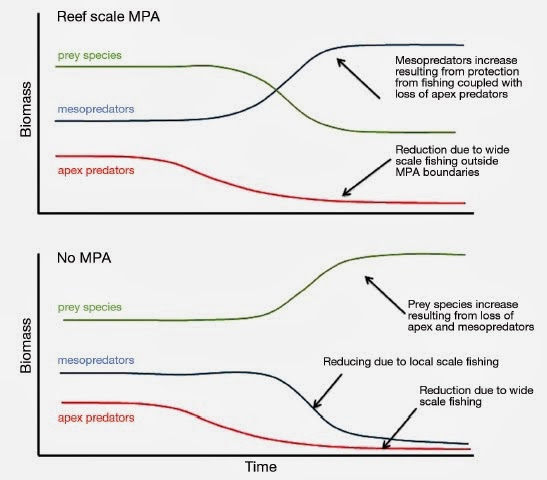Big Fiji Bull Sharks - definitely Apex! Click for detail!
Hallelujah!
This has one of my pet peeves for a very long time indeed.
And now a panel of illustrious researchers are confirming that the vast majority of Sharks are not apex predators but instead, best described as mesopredators, to wit
We might talk of apex size classes rather than apex species in relation to sharks and other marine predators that grow indeterminately throughout their lives.
Using the criterion of apex size classes, the categorisation of sharks as apex predators would be restricted mainly to adults of large-bodied and wide-ranging species that influence many species within a community. Use of this definition would limit the term apex predator to large individuals (>3 m) such as older juvenile or adult white, tiger, hammerhead and dusky sharks...
(and adult Bull Sharks!)
Most shark species and size classes are in fact best described in the role of mesopredator.
The ecological role of sharks within the diverse and impacted marine environment requires careful consideration.
There you have it.
And the same undoubtedly applies to the terms of keystone and umbrella species that are so liberally bandied about by some quarters within the movement!
You can read the whole paper here.
And there's one more interesting observation, and I cite.
Our size-based view of the classification of predatory roles raises important questions about what objectives to manage, and how these objectives can be best achieved.
Protection of reef communities through marine protected areas (MPAs) or fisheries regulation (or indeed, naturally on those few locations far from human population centres) would ensure the mesopredator sharks on these reefs are sheltered from fishing pressure. However, the same may not be true for apex predators because their broad movement patterns and large home ranges (Meyer et al. 2009) would expose them to a greater diversity of fishing fleets and gears, and thus a greater overall mortality than the smaller-ranging, reef-dwelling mesopredators. Hence, the apex predators of coral reefs may be silently eliminated by offshore pelagic longline fisheries, unbeknownst to those managing reef diversity and function (Cox et al. 2002).Therefore, reef-based MPAs are not adequate to protect these species.
296 Fig. 2. Conceptual diagram outlining the loss of apex predators from reef regions and corresponding system responses where a marine protected area (MPA) is present (upper) or absent (lower). Presence of MPAs leads to different states of equilibrium on individual reefs
Avoiding and mitigating these impacts may require consideration of the ecosystem- and jurisdiction-crossing movements of apex species and size classes. Therefore, management needs to consider not only the effect of reef-based spatial closure, but the amount of time these regions provide shelter to large, mobile, apex species.
This of course eminently important for the SRMR
There, the range of the Bulls and especially the Tigers is clearly much larger than the MPA proper - but this is exactly why we did establish the Fiji Shark Corridor that is conferring a solid, albeit not perfect degree of protection to our Bulls. The possibly highly migratory Tigers, alas, probably not so much - tho we will likely never know as the observed competitive exclusion may well end up masking any losses due to fishing.
This is why the river nursery work is so vital.
Compared to the large and relatively inaccessible ranges of the adults, those nurseries are discrete and relatively small areas where conservation measures may well be easier to implement. We know that the Fijian rivers do not only feature juvenile Bulls but also juveniles of the endangered and probably highly migratory Scalloped Hammerhead - and I betcha that upon closer inspection, we'll also find Nurses and Lemons.
And once we dispose of the necessary data, we will certainly do our darn best to have those habitats protected!
But I'm digressing as always.
Brilliant paper - enjoy!






4 comments:
Your title is misleading. Last I checked, those apex sharks listed are sharks. Should be "not all sharks are apex predators."
Yup - but they are the rare exception!
What you propose is akin to saying "not all birds can fly" = nearly all can.
But if I understand the paper, of the 500+ species of Shark, those that qualify as apex predators are merely the large subadults and the adults of GWS, OWT, Dusky, Galapagos, Tiger, Bull, Great HH, the Makos, maybe the Greenland.
So the rule is that "Sharks" are not apex predators (like: "birds" can fly), with those exceptions confirming the rule.
If true -and I believe it is- that's a far cry from what is currently being asserted by many Shark conservation advocates.
To put this formally:
AP = Apex Predator
S = Shark
Forall x :- - -[AP]
No hold on.
Take any x:- iff AP then:- - - S
No that's not it.
For-any-x-that-is-a-S: iff AP then: dang, hold on...
Iff x=AP & S=AP:...
Never mind.
Easy:
If S + big + badass = AP
If not, not.
Post a Comment